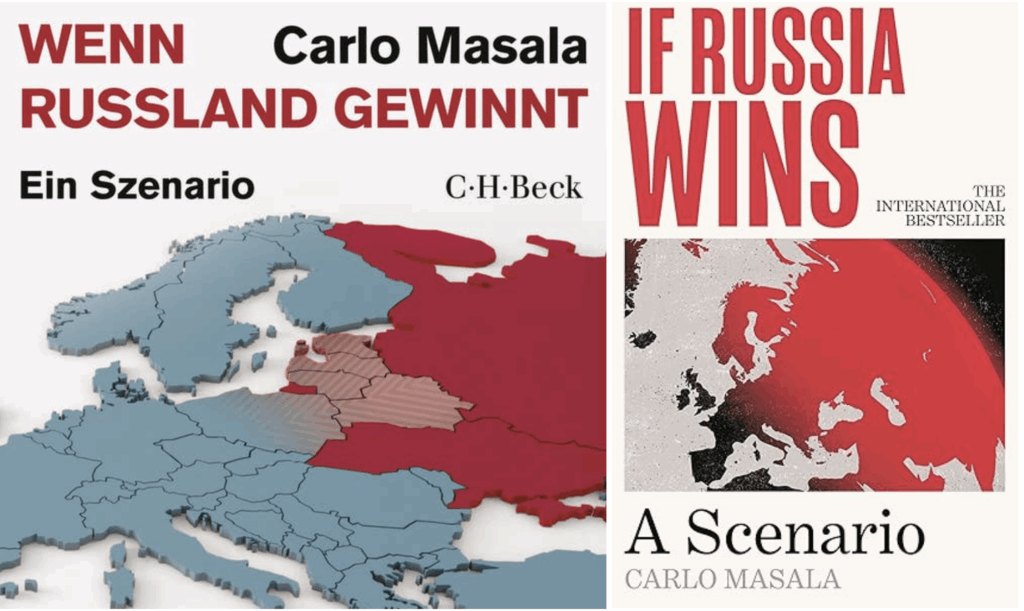Indifference or half-measures in the face of aggression embolden autocracies, reminds Carlo Masala, professor of international politics at Bundeswehr University Munich. Masala delivers a chilling geopolitical case study in his compact but sharply focused book Wenn Russland gewinnt. Ein Szenario (2025).
Carlo Masala constructs a detailed hypothetical scenario whereby, in March 2028, after a formally concluded but ultimately Russian‑favoured war in Ukraine, Moscow tests NATO’s resolve by occupying Narva and the island of Hiiumaa, threatening Baltic security and stretching alliance cohesion to breaking point.
In Masala’s conception, post‑war détente leads Europe—and the US—to ease up on defence, while Russia rebuilds its military in the shadows. A sudden limited strike in Estonia exposes how thin NATO’s political and military unity really is. The book raises the spectre of NATO’s Article 5 being denied and the alliance unravelling under calculated Russian pressure.
At just 116 pages, the narrative is lean—almost clinical. No political novel, no emotional drama—just scenario development scaffolded by timelines, policymaker indecision, and cascading strategic consequences.
From Distractions to NATO Paralysis
- 2025–2027: Western drawdown after Ukraine war; NATO divides; Russia rebuilds quietly.
- 27 March 2028: Simultaneous Russian landings in Narva and on Hiiumaa.
- EU distractions: migration crises and terrorist strikes divert attention.
- Suwałki corridor becomes sole lifeline for NATO access to the Baltics, blocked at sea.
- NATO paralysis at summit; Article 5 rejected as “limited incursion.”
- US abstains, citing refusal to risk global war. NATO Secretary-General calls it a “black day” for the alliance.
Masala emphasises that indifference or half-measures in the face of aggression embolden autocracies. Unless European and US leaders are prepared to fully and unmistakably uphold collective defence, deterrence collapses. If Article 5’s credibility is eroded, NATO becomes functionally defunct.
Strategic Patience and Russian Calculus
Masala argues Putin’s Russia is playing the long game—with patient escalation, seeking a measured stress test of NATO rather than all‑out war. The Baltic strike is designed as a calibrated probe, not a total war. The scenario hinges on political fragmentation: if France or Germany avoid direct confrontation over “small” Estonian incursions, collective defence unravels. Masala warns of domestic political calculus overruling commitment to Article 5 in places like France, UK, Germany
Multi‑theatre Distraction and Hybrid Pressure
Russia engineers crises elsewhere—terror attacks in Western capitals, migrant surges triggered in Africa—to soak up EU response resources and slogan defence unity. A diversional campaign that softens European resolve. Masala finds folly in assuming Russia will cease ties after battlefield gains in Ukraine. The scenario shows how weak strategic foresight—believing the war’s end equals permanent peace—sets the stage for renewed aggression.
Masala’s book has many strengths, like its shock value. It is concise, yet vivid. Masala is unsettlingly plausible. He uses realistic timelines and political dynamics. The book is a timely warning, underscoring the danger of Western military complacency post‑Ukraine. If Russia wins presents hybrid warfare tools well, political, cyber, migration—as central to modern aggression.
However, Masala’s scenario has its limitations. Its scope is quite selective, focusing on a single flashpoint scenario with limited examination of broader war escalations. In his political assumptions, Masala presumes Western democracies under certain ideological leadership would capitulate. Thankfully, that is less certain in practice. Masala offers no alternatives in his limited exploration of how NATO might respond daringly or reform Article 5 crisis procedures.
Investing in Hybrid Deterrence
For policy experts, the book has some implications. It is a direct call to reaffirm Article 5 and practice credible, rapid collective defence, not only in Warsaw or Berlin, but in the Baltic periphery. It encourages investment in hybrid deterrence. Hybrid operations are central: cyber, disinformation, sabotage, plus kinetic landings. Europe needs hard power—and resilience against influence operations.
The book encourages strengthening Baltic access and supply lines. Defence planning must secure Suwałki corridor logistics, naval access in the Baltic, and ensure US-EU interoperability for rapid bulk reinforcement.
Masala’s scenario emphasises the need for pre‑agreed decision thresholds, crisis decision‑making mechanisms, and transatlantic unity—even when public appetite for war is low.
If Russia Wins: A Scenario serves as a succinct, high-impact warning of what happens when deterrence is eroded and alliances fail to act—in an age of hybrid war. Masala’s scenario is about more than Estonia: it’s about respect for treaties, clarity of strategy, and the political courage to deter authoritarian revisionism. While speculative, the scenario should be treated not as distant fiction but as a stress test blueprint for alliance reform, defence readiness, and enduring transatlantic solidarity. The real possibility is not war in 2028—but a breakdown today that makes it inevitable tomorrow.



